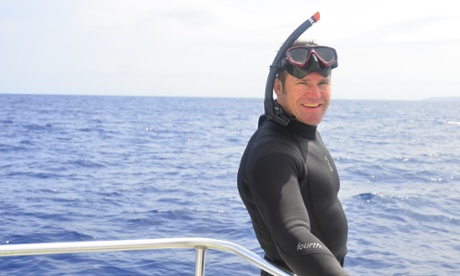All it takes to conjure an instant sense of danger in anyone who has watched Jaws is two notes, a semitone apart, ingeniously deployed to indicate the impending threat of a great white shark.
But now, nearly half a century on, director Steven Spielberg has conceded that perhaps the Oscar-winning 1975 thriller was too effective at conjuring fear of the defamed creatures, admitting he is “truly regretful” for any influence he has had on the world’s rapidly shrinking shark population.
Since the early 70s, the world’s population of oceanic sharks and rays has fallen by 71% as a result of overfishing, a global study published in Nature found last year.
“I truly and to this day regret the decimation of the shark population because of the book and the film. I really, truly regret that,” the American director tells Desert Island Discs, to be broadcast on BBC Radio 4 on Sunday.
Asked by presenter Lauren Laverne how he would feel about having sharks circling him if he were sent to the show’s imaginary desert island, the 75-year-old said: “That’s one of the things I still fear. Not to get eaten by a shark, but that sharks are somehow mad at me for the feeding frenzy of crazy sports fishermen that happened after 1975.”
According to the global IUCN red list of threatened species, more than a third of all shark species are threatened with extinction, while three-quarters of oceanic shark species face the threat.
But Paul Cox, chief executive of the Shark Trust in Plymouth, said that although shark populations had shrunk dramatically since the film’s release, to put the blame on Jaws is “giving the film far too much credit”.
Most people, he believes, are capable of discerning between life and cinemas.
“The cases of shark population decline are very clearly fisheries overfishing,” he said.
While demand for shark fins has shrunk in recent years, the desire for shark meat is on the rise.
Where Jaws may have had an impact, however, is in clouding the messaging around sharks, Cox said: “It has led conversations into a bit of a trap in spending too much time talking about all the things that sharks aren’t rather than all the great things sharks are.”
He is, however, grateful for the positive PR that Spielberg’s comments offer. “For someone with his celebrity to be addressing the challenge of communicating about sharks in a more positive way is very welcome.”
The film exploits a pre-existing fear, he said. “It’s a natural fear we have of the unknown. The sea, the marine environment, still has a lot of unknowns.”
Christopher Paul Jones, a Harley Street phobia specialist, is convinced of the film’s power. Most of the people he encounters with galeophobia, or fear of sharks, go back to films such as Jaws because most people have never seen a shark except in an aquarium.
“It’s testament to the way it was done. You can’t see below water, and the music creates a sense of fear,” he said. “Movies are very good at hitting every sense – visual, sound, and can be very impactful on how we feel.”
He said that films such as Jaws are often “the seed of the emotion”. “People will come to me – it might not be a fear of sharks but a fear of swimming or water. When you look at how it started, it can be Jaws.”
In another Desert Island Discs confession, Spielberg said that film-makers should not “manipulate” audiences by playing on their emotions, but admitted that he had been guilty of it in Jaws. “A film-maker must never manipulate the audience unless every single scene has a jack-in-the-box kind of scare. That’s manipulation,” he said. “I did that a couple of times in Poltergeist and I certainly did it once in Jaws, where the head comes out of the hole. That’s OK, I confess that.”
Among his desert island discs were Bach’s “Little” Fugue in G Minor, which his father used to whistle when he got home from work; Jackie DeShannon’s What the World Needs Now is Love, which he said makes him “want to hug a Republican”; and a song by his daughter, Sasha, whose stage name is Buzzy Lee. The song, Coolhand, reminds him of “the privilege of parenthood”, he said. His luxury item would be a vintage Bolex H-8 movie camera.
He talked about childhood memories – including making a three-minute western for a Boy Scout badge, his mother dancing around the house, and his 15-year estrangement from his father after his parents’ divorce.
Spielberg, whose many other films include the blockbusters ET, Indiana Jones, and Jurassic Park, feared that his latest project, a semi-autobiographical film called The Fabelmans, would be the “most self indulgent thing I’ve ever asked people to accompany me through”.
Describing the project, starring Paul Dano and Michelle Williams, as “$40m of therapy”, he said: “I didn’t know really what I was doing, except I was answering a need I had – being an orphan, or recently orphaned by the loss of both parents, to recapture some of those memories in some way that wouldn’t seem too indulgent to actors I really respected. So it was a tightrope for a while.”
But the film has already received broad critical acclaim and nominations for the Golden Globes and Critics Choice awards.
He said he did not mind being seen as sentimental and nostalgic, adding: “I think it’s nostalgia even more than sentimentality, but I never bristle when I hear that at all unless somebody says it ruined the movie for them … I don’t like that.”











